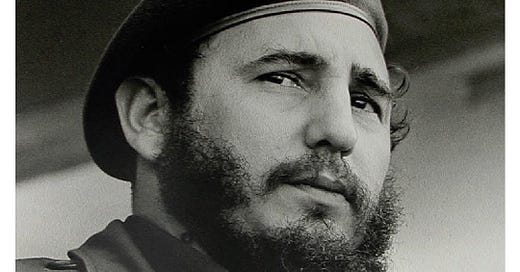Justin Trudeau and Jagmeet Singh greatly admire Fidel Castro and the Cuban Revolution. Fidel Castro despotically ruled Cuba from 1959 to 2008. His odious Communist regime has delivered suffering to millions across generations despite the morbid Canadian admiration for it.
The Castro regime was notorious for its restrictions on political freedoms. Cuba ranks 171 out of 180 countries on the World Press Freedom Index. The government suppressed dissent through censorship, imprisonment, and intimidation, effectively silencing any opposition. That created an atmosphere of fear and repression, stifling free speech and political activism.
Economic policies under Castro's rule were marked by centralization and state control, which led to widespread poverty and inefficiency. The nationalization of industries and collectivization of agriculture disrupted economic productivity, resulting in shortages of basic goods and services. This economic mismanagement severely affected the quality of life for ordinary Cubans.
Human rights abuses are under the Castro regime. Reports of arbitrary detention, torture, and extrajudicial executions are common. Political prisoners often face harsh conditions and long sentences for simply expressing dissenting views or attempting to organize opposition movements.
The regime's control extends to nearly every aspect of daily life, including education, healthcare, and employment. While some praised the "improvements" in literacy and healthcare, these have been grossly inflated and came at the cost of personal freedoms and autonomy. The state dictates career paths and educational opportunities, limiting individual choice and potential.
Cuban exiles and dissidents face severe repercussions domestically and internationally. Families are often separated, and individuals flee the oppressive regime, seeking asylum in other countries. The government's surveillance and infiltration of exile communities further exacerbated the sense of insecurity and fear among those who opposed the regime.
The Castro regime's foreign policy also contributes to its notoriety. By aligning with the Soviet Union during the Cold War, Cuba became a focal point of geopolitical tensions, most notably during the Cuban Missile Crisis. This alignment isolated Cuba from many Western countries and subjected its citizens to the hardships of economic embargoes and international sanctions.
Despite all this, many brave souls have risked life and limb to oppose the Communist tyrant, Fidel Castro, and his successors. More than 500 dissidents were arrested in 2021. Here are a few that the world has recognized.
One of the most prominent Cuban dissidents was Oswaldo Payá. He founded the Christian Liberation Movement and spearheaded the Varela Project, which sought to gather signatures to demand a national referendum on laws guaranteeing civil liberties. Payá's efforts earned him international recognition, including the Sakharov Prize for Freedom of Thought from the European Parliament 2002. His untimely death in a car crash in 2012 remains controversial, with many suspecting foul play by the Cuban government.
Another key figure in the dissident movement was Yoani Sánchez, a blogger and journalist who gained international fame through her blog 'Generación Y.' Sánchez used her platform to criticize the Cuban government and highlight the daily struggles of ordinary Cubans. Despite facing harassment and restrictions, she continued to advocate for freedom of expression and human rights, earning numerous awards, including the Ortega y Gasset Journalism Award in 2008.
Guillermo Fariñas is another influential dissident known for his hunger strikes to protest against the Cuban government's human rights abuses. A psychologist and journalist, Fariñas has been imprisoned multiple times for his activism. His most notable hunger strike in 2010, which lasted 135 days, was aimed at securing the release of political prisoners. His unwavering commitment to non-violent resistance earned him the Sakharov Prize for Freedom of Thought 2010.
Ladies in White (Damas de Blanco) is a significant dissident group composed of wives and female relatives of jailed dissidents. Formed in 2003, the group gained international attention for their peaceful marches in Havana, dressed in white and carrying gladiolus flowers. Their persistent efforts to demand the release of political prisoners have made them a symbol of peaceful resistance in Cuba. The group was awarded the Sakharov Prize for Freedom of Thought in 2005.
Dr. Óscar Elías Biscet, a physician and human rights activist, is another notable dissident. He founded the Lawton Foundation for Human Rights and has been a vocal critic of the Cuban government's policies, particularly its healthcare system and human rights record. Biscet has been imprisoned multiple times for his activism, enduring harsh conditions and mistreatment. His courage and dedication to the cause of freedom have earned him international recognition, including the Presidential Medal of Freedom from the United States in 2007.
People travelling to Cuba for pleasure unwittingly support the regime. Those who value liberty and human dignity should think twice about vacationing there.




